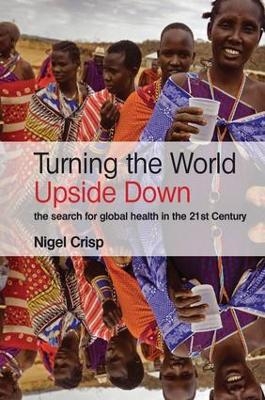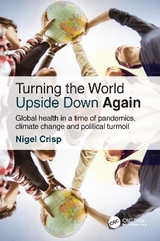
Turning the World Upside Down
Royal Society of Medicine Press Ltd (Verlag)
978-1-85315-933-6 (ISBN)
- Titel erscheint in neuer Auflage
- Artikel merken
Turning the World Upside Down is a search to understand what is happening and what it means for us all. It is based on Nigel Crisp's own journey from running the largest health system in the world to working in some of the poorest countries, and draws upon his own experiences to explore new ideas and innovations around the world.
The book has three unique features:
Describes what rich countries can learn from poorer ones, as well as the other way round
Deals with health in rich and poor countries in the same way, not treating them as totally different, and suggests that instead of talking about international development we should talk about co-development
Sets out a new vision for global health, and our rights and accountabilities as citizens of the world
There is an unfair import export business in people and ideas that flourishes between rich and poor countries. Rich countries import trained health workers and export their ideas and ideology about health in poorer ones, whether or not they are appropriate or useful. What, Nigel Crisp asks, if we were to turn the world upside down - so the import export business was reversed and poorer countries exported their ideas and experience whilst richer ones exported their health workers?
Health leaders in poorer countries, without the resources or the baggage of rich countries, have learned to innovate, to build on the strengths of the population and their communities and develop new approaches that are relevant for the rich and poor alike. At the same time, richer countries and their health workers could help poorer countries to train, in their own country, the workers they need for the future. They would help pay a debt for all the workers who have migrated and learn themselves the new ways of working, which they will need in the 21st Century.
We could stop talking about international development - as something the rich world does to the poor - and start talking about co-development, our shared learning and shared future. There is already a movement of people and ideas travelling in this direction. Young people get this intuitively. Many thousands of young professionals want a different professional education for themselves - in global health. Together with the leaders from poorer countries and the innovators around the world, they are creating a new global vision for health.
Turning the World Upside Down is a search for understanding that helps us to see how Western Scientific Medicine, which has served us so well in the 20th Century, needs to adapt and evolve to cope with the demands of the 21st Century. It sets our a new vision and concludes by describing the actions we need to take to accelerate the change.
Lord Nigel Crisp has unique experience of health in both rich and poor countries. He ran the UK's National Health Service for more than 5 years and was, exceptionally, head of the Department of Health at the same time. The NHS is the world's biggest health system and the 4th biggest organisation in the world with 1.3 million staff and £90 billion annual turnover. He has subsequently worked extensively in poor countries as an advisor to Tony Blair and consultant to the World Health Organisation and the Gates Foundation. He is currently supporting Sarah Brown with the Maternal Mortality Campaign and has founded the Zambia UK Health Workforce Alliance to promote mutual learning and development. He has published two very influential reports - Global Health Partnerships in 2007 and Scaling up, Saving Lives in 2008 as well as several chapters and articles in journals such as The BMJ and The Lancet and is in demand globally as a thinker and speaker on global health. Nigel Crisp is an independent Peer in the House of Lords, Chair of Sightsavers International, a Professor at the London School of Hygiene and Tropical Medicine, a Senior Fellow of the Institute for Healthcare Improvement in Cambridge, Massachusetts and an Honorary Fellow of St John's College, Cambridge and of the Royal College of Physicians. More information is available at http://www.nigelcrisp.com
Health and poverty. Health and wealth. Unfair trade (1): exporting health workers. Unfair trade (2): importing ideas and ideology. Learning from low- and middle-income countries. Practical knowledge for the twenty-first century. Practical knowledge for the twenty-first century. The paradigm shift to global health. Action.
| Erscheint lt. Verlag | 15.1.2010 |
|---|---|
| Verlagsort | London |
| Sprache | englisch |
| Maße | 156 x 234 mm |
| Themenwelt | Studium ► Querschnittsbereiche ► Prävention / Gesundheitsförderung |
| ISBN-10 | 1-85315-933-6 / 1853159336 |
| ISBN-13 | 978-1-85315-933-6 / 9781853159336 |
| Zustand | Neuware |
| Informationen gemäß Produktsicherheitsverordnung (GPSR) | |
| Haben Sie eine Frage zum Produkt? |
aus dem Bereich



